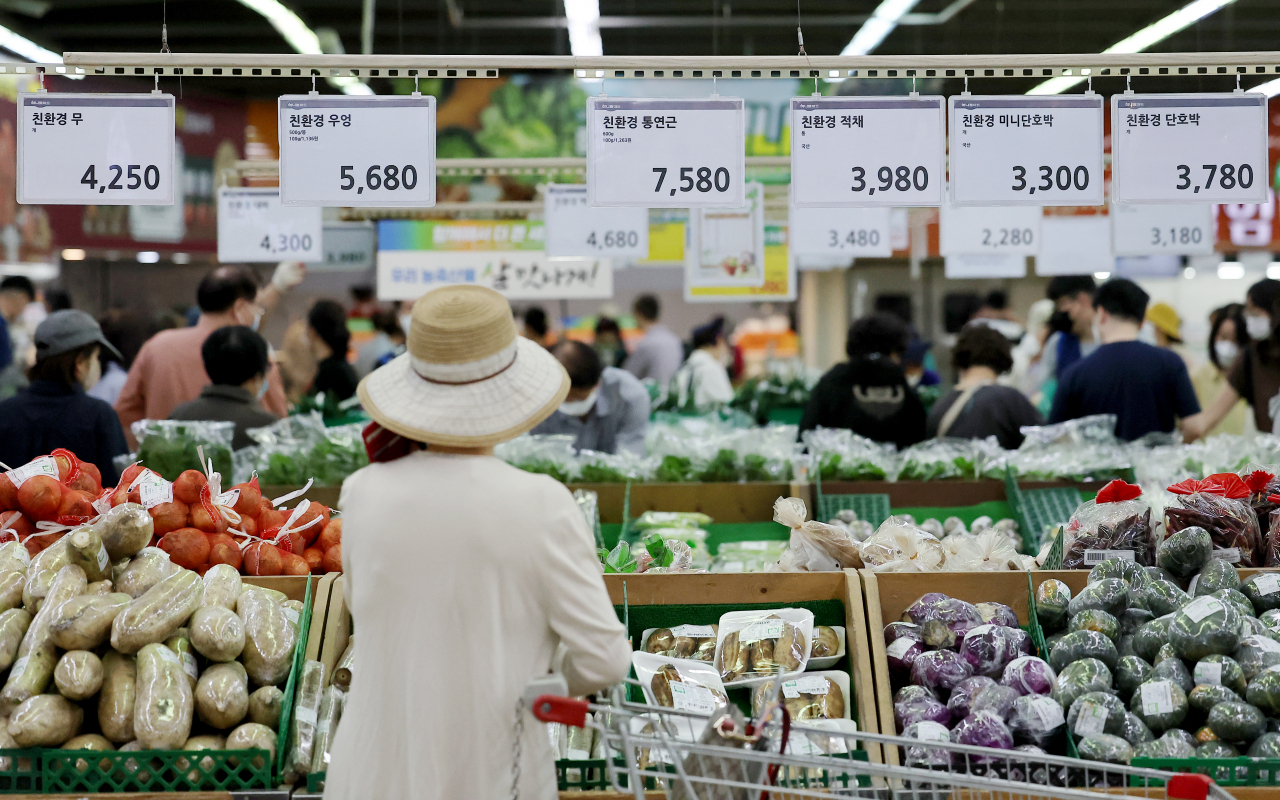 |
Citizens shop for vegetables at a discount store in Seoul last Sunday. (Yonhap) |
South Korea's consumer prices grew at a slower in August after running at a 24-year high the previous month as global oil prices slid, data showed Friday, in a sign that high inflation may have peaked.
But inflationary pressure still remains high, given volatility in oil prices and a weaker won, fanning expectations that the central bank will likely further raise the policy rate.
Consumer prices, a key gauge of inflation, jumped 5.7 percent last month from a year earlier, slowing from a 6.3 percent surge in July, according to the data from Statistics Korea.
The on-year growth of consumer prices slowed for the first time in seven months. The inflation rate stayed in the 6 percent range for the second straight month in July.
Compared with a month earlier, consumer inflation fell 0.1 percent, the first on-month decline in 21 months.
Consumer prices rose above 2 percent -- the central bank's inflation target over the medium term -- for the 17th straight month in August.
The statistics agency said prices of industrial goods, personal services and farm products extended their gains in August.
"But as prices of petroleum products sharply slowed, the inflation rate decelerated (from July)," Eo Woon-sun, a senior Statistics Korea official, told reporters.
He said the Chuseok fall harvest holiday set for this month would put upward pressure on food prices, but given last year's high base, the growth of consumer prices may not be that high in September.
Global oil prices fell amid concerns that aggressive monetary tightening in major economies could slow the global economy and weaken demand for fuel.
Prices of Dubai crude, South Korea's benchmark, stood at US$96.63 per barrel on average in August, down 6.3 percent from the previous month. The oil prices were still up 39 percent from a year ago.
Despite a letup in the August inflation, South Korea still faces high inflationary pressure as crude oil and other commodity prices rose due to the protracted war between Russia and Ukraine, and global supply disruptions. A recovery in demand from the pandemic also exerted upward pressure on prices.
Last month, prices of petroleum products jumped 19.7 percent on-year, slowing from a 35.1 percent advance in July. The August reading marked the slowest gain in six months. South Korea depends mainly on imports for its energy needs.
Prices of agricultural, livestock and fisheries goods went up 7 percent on-year. Amid frequent rains, vegetable prices climbed 27.9 percent, picking up from a 25.9 percent spike in July.
Prices of personal services increased 6.1 percent, the steepest on-year gain in over 24 years, driven by a recovery in demand and the lifting of major virus curbs. The cost of dining out expanded 8.8 percent, the highest in 30 years.
Core inflation, which excludes volatile food and oil prices, rose 4 percent on-year last month.
Prices of daily necessities -- 141 items closely related to people's daily lives, such as food, clothing and housing -- jumped 6.8 percent in August, slowing from a 7.9 percent increase in July.
High inflationary pressure will likely build the case for the Bank of Korea (BOK) to further raise the key interest rate in the coming months.
Last month, the BOK raised the key interest rate by 0.25 percentage point to 2.5 percent. The decision followed its first-ever "big-step" rate hike of 50 basis points in July and marked the seventh rate increase since August last year.
South Korea has faced the risk of stagflation, a mix of slowing growth and high inflation, due to heightened external economic uncertainty.
Inflation erodes people's purchasing power and could weigh on private spending. A rate hike is intended to curb inflation, but it could increase debt-servicing burdens and slow down economic growth.
In its latest revised outlook, the BOK lowered its 2022 economic growth forecast to 2.6 percent from 2.7 percent. The central bank sharply raised this year's inflation estimate to a 24-year high of 5.2 percent from 4.5 percent.
Finance Minister Choo Kyung-ho said last month consumer prices are expected to gradually slow after moving in the early 6-percent range.
Experts said inflation may have peaked in July, but uncertainty about price pressure still remains high amid talks of a cut in oil supply and the local currency's sharp weakness.
A weaker won puts upward pressure on inflation, as it boosts import bills. The Korean currency has depreciated about 12 percent against the U.S. dollar so far this year.
The government has expanded the supply of key foodstuff to help stabilize prices in the run-up to the extended Chuseok fall harvest holiday that runs from Sept. 9-12.
Demand for vegetables, fruits, eggs and other foodstuff usually rises in South Korea ahead of the Lunar New Year and Chuseok holidays as people prepare holiday meals for family gatherings. (Yonhap)







